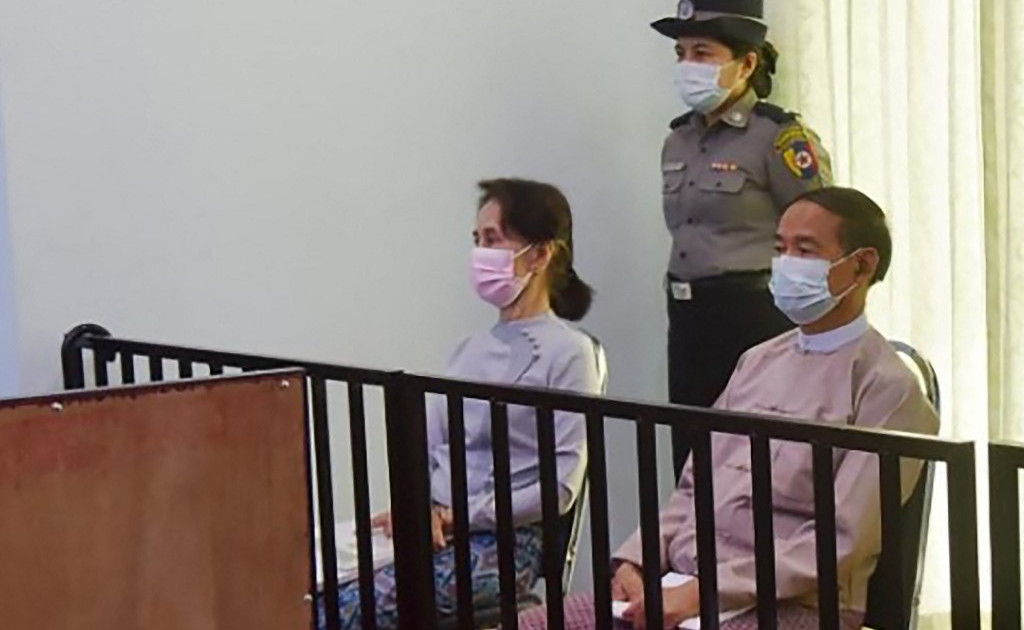Myanmar’s deposed leader Aung San Suu Kyi is facing four additional criminal charges, filed in a court in the country’s second-biggest city Mandalay, according to her lawyer, as the United Nations called for reconciliation in the violence-wracked Southeast Asian nation.
Aung San Suu Kyi’s legal team had little information about the latest charges, except that they relate to corruption and that two were also levelled at Min Thu, a former minister in her government, lawyer Min Min Soe told the Reuters news agency on Monday.
“There are corruption charges. We do not know why do they sue? Or for what reasons? We will find out about it,” she said.
The new cases could see Aung San Suu Kyi, 76, tied up in legal proceedings in three different cities.
The Nobel Peace Prize laureate has been held since the military seized power in a February 1 coup and is on trial in the capital, Naypyidaw, over charges that include illegal importation and possession of walkie-talkie radios and violating coronavirus protocols under a disaster management law.
She is charged also in a Yangon court, accused of unspecified breaches of the Official Secrets Act, punishable by a maximum of 14 years in jail.
Her legal team rejects all the charges.
Chief lawyer Khin Maung Zaw said cross-examination on Monday of a prosecution witness revealed a raid on Aung San Suu Kyi’s home had been carried out illegally without a warrant.
At a news conference on Monday, military spokesman Zaw Min Tun made no mention of any new charges.
He said she had breached the constitution when the post of state counsellor was created, which he said came between the president and vice presidents in the command structure.
It was not clear if that allegation was among the new charges.
Aung San Suu Kyi was barred from the presidency because her late husband and children have foreign citizenship. After her party won the country’s first election, she was appointed to a new role – state counsellor – and served in that position as the country’s de facto leader before the generals grabbed power.
People on Monday night seen waiting for hours to get oxygen refills in Yangon as fierce coronavirus outbreak hits Myanmar. #WhatsHappeningInMyanmar #COVID19 pic.twitter.com/om0gwWgvX7
— Hnin Zaw (@hninyadanazaw) July 12, 2021
Call for reconciliation
On Monday, the UN Human Rights Council adopted a resolution condemning human rights violations by the military against the Rohingya and other minorities in Myanmar and called for a process of reconciliation in the country.
The resolution, brought forward by Pakistan on behalf of the Organisation of Islamic Cooperation, was approved without a vote in the Geneva-based council.
China, one of the 47 council members, said it could not join the consensus but nonetheless did not insist on bringing the text to a vote.
“Unfortunately, the humanitarian and human rights situation of Rohingya Muslims remains dire, and therefore requires a collective call by the council asking Myanmar to immediately halt human rights violations, and to uphold their fundamental rights,” said Khalil Hashmi, Pakistan’s ambassador to the UN in Geneva.
The text itself calls for a “constructive and peaceful dialogue and reconciliation, in accordance with the will and interests of the people of Myanmar, including Rohingya Muslims and other ethnic minorities”.
The resolution also calls for the immediate cessation of fighting and hostilities, the targeting of civilians and of all violations of humanitarian and rights laws.
It voices “grave concern” at continuing reports of serious human rights violations and abuses, including arbitrary arrests, deaths in detention, torture, forced labour and “the deliberate killing and maiming of children”.
 People stand with empty oxygen canisters as they wait to fill them up outside a factory in Yangon on Sunday, amid a surge in COVID-19 coronavirus cases [Ye Aung Thu/AFP]
People stand with empty oxygen canisters as they wait to fill them up outside a factory in Yangon on Sunday, amid a surge in COVID-19 coronavirus cases [Ye Aung Thu/AFP]Thomas Andrews, the UN’s special rapporteur on the rights situation in Myanmar, told the Human Rights Council last week that the military had carried out crimes against humanity since taking control and condemned the international community for failing to “end this nightmare”.
UN Human Rights chief Michelle Bachelet also told the council that the situation in the country had “evolved from a political crisis to a multi-dimensional human rights catastrophe”.
Since the coup, nearly 900 people have been killed, while about 200,000 have been forced to flee their homes, according to the UN.
The country is also facing a separate health emergency following a surge in the number of COVID-19 cases.
The military generals say that there were 3,400 new coronavirus cases on Sunday, up from fewer than 50 per day in early May. Overall, the country has reported at least 192,000 cases and more than 3,800 deaths, although the real number is likely to be much higher given the collapse of the health system – and the country’s COVID-19 response – in the wake of the coup.
On Tuesday, there were reports from Myanmar media of soldiers firing shots to disperse a crowd buying medical oxygen in Yangon’s South Dagon district.
